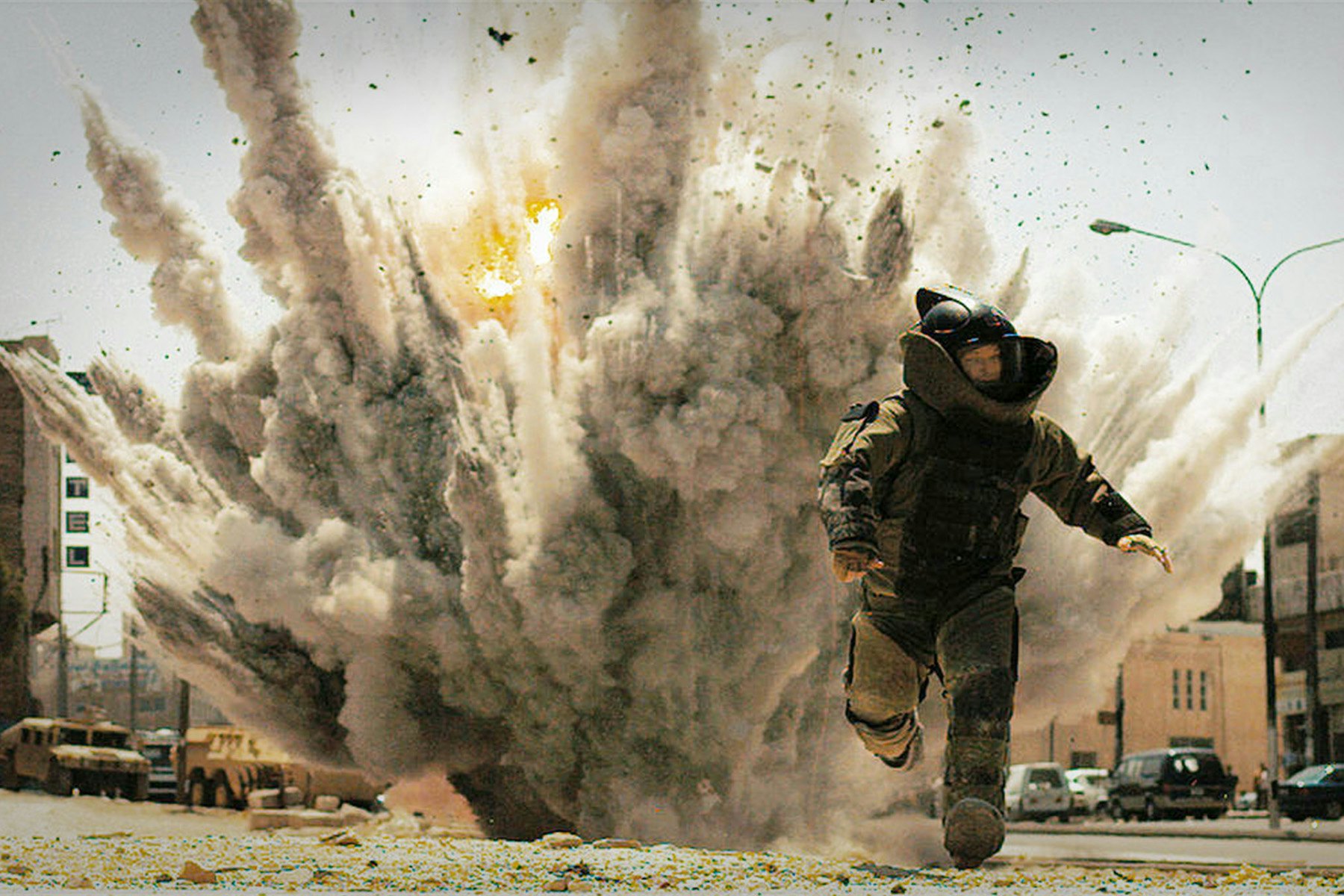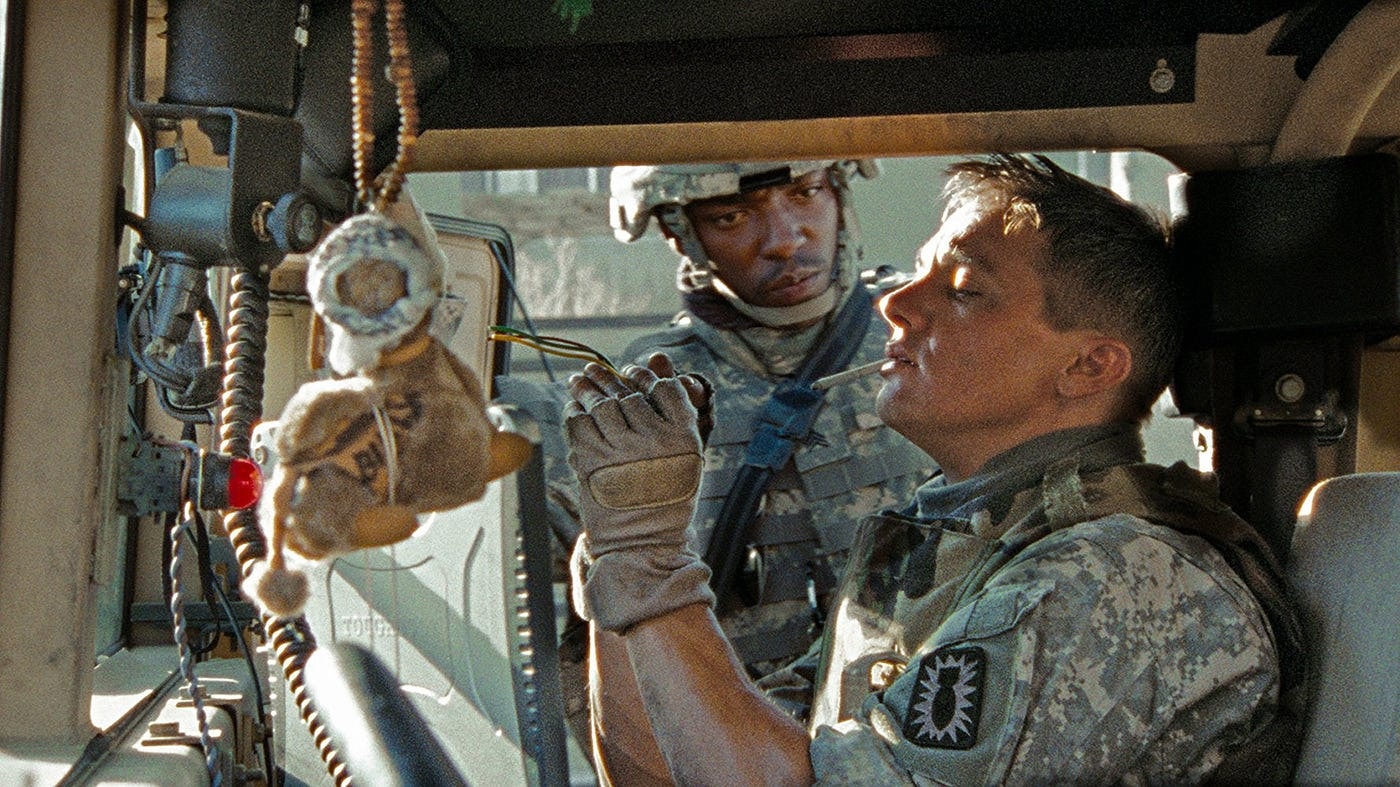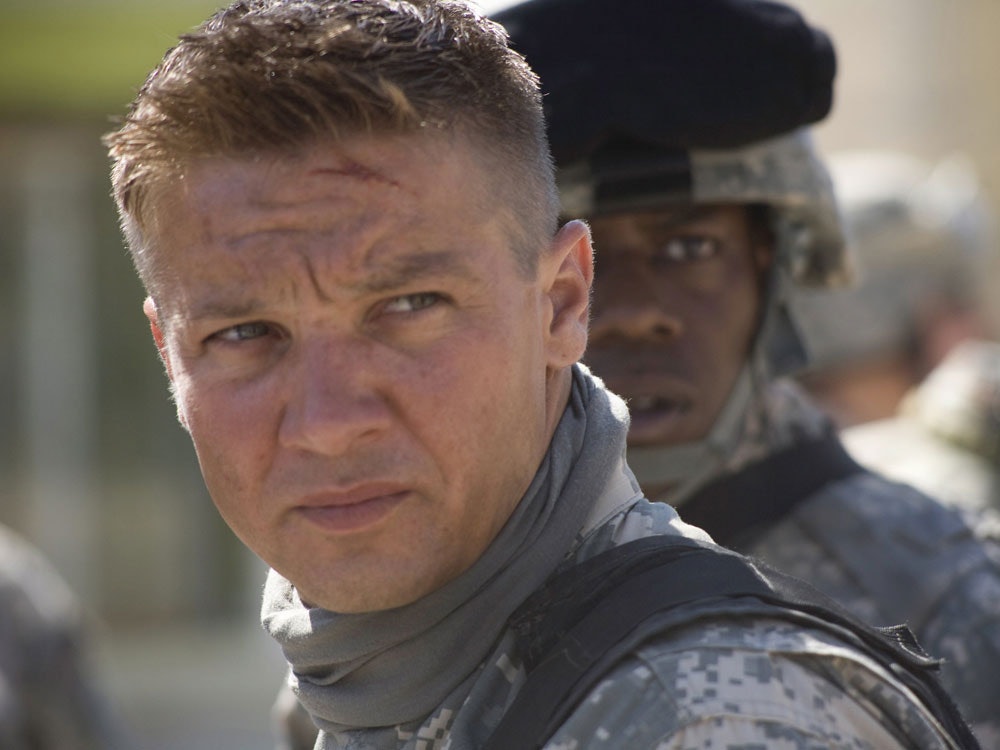
Kathryn Bigelow’s The Hurt Locker begins with a telling quote: “The rush of battle is often a potent and lethal addiction, for war is a drug.” Most of the words, attributed to anti-war journalist Chris Hedges, fade away, leaving only the phrase “war is a drug.” While Bigelow’s character study certainly revealed the psychological horrors facing American soldiers during the Iraq War, 20 years later, its potent vision of the meaninglessness of war stands tall even as its status as an anti-war statement falls short.
Bigelow and screenwriter Mark Boal take a cogent path toward their anti-war goals. Their film zooms in on an Explosive Ordnance Disposal team whose sole job is to dismantle the tools of war. Within that group, they find an unlikely protagonist: the risky and rash Staff Sergeant William James (Jeremy Renner). He has arrived to replace Staff Sergeant Matthew Thompson (Guy Pearce), who recently perished while attempting to dismantle a roadside bomb.
James is an adrenaline junkie. Having dismantled over 800 explosive devices, he has long put the idea of dying out of his head. His teammates, on the other hand, are still reeling from the death of their friend, and just want to finish their rotation and go home. Before long, James’ cavalier style antagonizes them. The by-the-book Sergeant J. T. Sanborn (Anthony Mackie) sees James as a redneck hick trying to undermine him. Specialist Owen Eldridge (Brian Geraghty) is terrified James will get him killed. Each of the trio, in some way, whether through contact with each other or with the lethal devices they approach everyday has been permanently affected by warfare.
That framing isn’t an uncommon feature to the director’s work. Bigelow has always been intrigued by characters grappling with deadly weapons, particularly men (Blue Steele, starring Jamie Lee Curits, is a notable exception). K-19: The Widowmaker, starring Harrison Ford and Liam Neeson as Russian submarine commanders, is a study of hypermasculinity and Cold War angst in a nuclear sub nearing the brink of implosion. It’s a surprisingly empathetic look at a country that, for the better part of four decades, represented an existential threat to America.
Later, however, Bigelow’s films started to take on a conservative approach. Zero Dark Thirty, the follow-up to The Hurt Locker, is essentially a pro-torture character study following CIA intelligence officer Maya (Jessica Chastain), who is attempting to hunt down Osama Bin Laden. Her last film, Detroit, is equally glib. Based on a real-life 1967 uprising in the motor city, it follows a Black security guard (John Boyega) who tries to keep the peace in the face of racist, violent cops. Detroit is a film baked in trauma, in the battering of Black bodies and centered by a passive, capitulating Black man who seems to be the antithesis of the righteous rage felt by the Black uprisers.
The Hurt Locker, therefore, offers a midpoint between Bigelow’s early well-meaning work and her later establishment turn.

Bigelow’s Iraq-set film, initially, is a keen piece of visual storytelling. There is, of course, the grainy, textured photography that pursues a sense of biting realism. There is also the intrusive camera that utilizes harsh zooms and push-ins meant to intimate the entrapment these soldiers feel, overwhelmed by the pressure and carnage around them. That invasiveness, tellingly, fades when these soldiers look at Iraqis. These nameless Brown people are sometimes shot from so far away, they’re nearly faceless. The distance ratchets up the danger these men feel — they’re constantly looking over their shoulders at silent specters staring at them — while also demonstrating the dehumanizing way they see Iraqis. These aren’t men, women, and children. These are menacing pawns who at any moment can attack.
“They all look the same,” says Sanborn. It’s not an accident that Bigelow had a Black man deliver that startling observation. When spoken by Sanborn, the derogatory remark exemplifies how the army has pushed people of color to not only see each other as enemies but to use the same language often directed at them to dehumanize others.
Bigelow, in fact, takes great care to show how the military industrial complex objectifies its own. When Eldridge goes to army psychologist Lieutenant Colonel John Cambridge (Christian Camargo) for help, for instance, Cambridge tells him to look at war as a fun time. He further instructs Eldridge to put the nihilism he feels out of his mind.
At the center of this storm is James. At first blush, James is your prototypical American action hero: He is a lone wolf, shoots from the hip, and is rarely frightened — traits, at the time, espoused by George W. Bush as leadership. Bigelow goes to great lengths to undermine the attachment Americans have to figures like this. James puts his team in real danger, such as allowing Eldridge to nearly be kidnapped by Iraqis during a late-night mission. He keeps bomb parts underneath his bed, showing that he isn’t unaffected by the specter of death, he’s just compartmentalized it in a seriously unhealthy way. The only person who doesn’t find him alarmingly reckless is a bloodthirsty Colonel (David Morse) who endearingly calls James “a wild man.”

While Bigelow does much to paint James as an unsavory soldier, her desires are rendered inadequate by a couple creative decisions. Bigelow gives a couple of reasons why these soldiers aren’t totally off base in their paranoia. When Cambridge goes out into the field, he approaches the Iraqis as a tourist. He is paternalistic and exoticizing, sure, but he isn’t mean-spirited. He is punished for his openness to these Iraqis, dying after he steps on an IED. James, meanwhile, becomes close with Beckham, an Iraqi boy selling bootleg DVDs. When he believes the boy has been killed, he becomes even more reckless — intimating that cold stoicism is the only way one can survive and function.
Still, those scenes, in some capacity, make sense if seen from the perspective of what war does to civilians, soldiers, and insurgents alike. Bigelow, nevertheless, makes her most critical error in the final scene. James, having returned home, bored by the monotony of civilian life — its own consumerism acting as a senseless hellscape — decides to go back for another tour. That concluding note is meant to be chilling. James is so broken by war, he can only function in war. He is so unfeeling, so unmoored by his earlier friendship with Beckham, he can barely interact with his own child. But that’s not how it plays.
For one, Renner is too good. Despite James’ worst flaws, Renner is so charismatic he often reinstills the unflappable cool Bigelow wants to undermine. The needle drop at the end, Ministry’s “Khyber Pass,” is a hell-raising metal track about hunting for Bin Laden — almost a sonic to-be-continued to Zero Dark Thirty. It stands as a kind of badass exit music that at once makes James’ twisted smile nightmarish to anti-war activists and fist-pumping for pro-war audiences.
While one could certainly blame the latter segment for misinterpreting that shot—Bigelow is aiming for a complex ending—if it’s only the choir who hears the preaching, then isn’t the sermon flawed?







